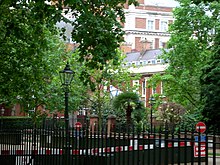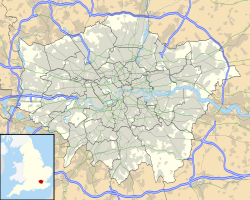| 1994 London Israeli Embassy bombing | |
|---|---|
 Israeli embassy in London Israeli embassy in London | |

| |
| Location | London, United Kingdom |
| Coordinates | 51°30′10.44″N 0°11′20.76″W / 51.5029000°N 0.1891000°W / 51.5029000; -0.1891000 |
| Date | 26 July 1994 |
| Target | Israeli embassy Balfour House |
| Attack type | Car bomb |
| Deaths | 0 |
| Injured | 20 |
| Motive | Palestinian nationalism |
| Convicted | Jawad Botmeh, Samar Alami |
The 1994 London Israeli Embassy bombing was a car bomb attack on 26 July 1994 against the Israeli embassy building in London, England. Twenty civilians were injured. A second bomb was exploded outside Balfour House, Finchley, premises occupied by the UJIA, a registered British charity.
The attack
A car containing 20 to 30 pounds (9.1 to 13.6 kg) of explosives parked in front of the embassy blew up minutes after the driver left it. The blast, which caused widespread damage, was heard over a mile away. Apart from damage to the embassy building, shop windows were blown out. The attack took place one day after King Hussein of Jordan and Israeli Prime Minister Yitzhak Rabin met in Washington, D.C. to discuss a Jordan-Israel peace treaty.
Thirteen hours later another car bomb exploded outside Balfour House, which at the time was the London headquarters of one of the largest Jewish charities, The United Jewish Israel Appeal (UJIA), injuring six.
Aftermath
Initially, the Israeli ambassador and British intelligence experts were blaming "pro-Iranian extremists, probably linked to the Lebanon-based Hezbollah group." Between the two attacks, letters were sent to two Arab newspapers claiming responsibility for both bombs on behalf of the "Palestinian Resistance Jaffa Group".
Five Palestinians were arrested in London in January 1995 in connection with the bombings. In December 1996, two of them, both Palestinian science graduates educated in the UK, Jawad Botmeh and Samar Alami, were found guilty of "conspiracy to cause explosions" at the Old Bailey. They were sentenced to 20 years in jail, and lost their appeal in 2001.
Botmeh was released from prison in 2008.
Former MI5 agent David Shayler stated that the British security services were warned of a plan to attack the embassy in advance, yet took no action. The Crown Prosecution Service later confirmed a warning had been received, though it related to a plan by a group unconnected to those who were convicted of the bombing. The Home Secretary at the time, Jack Straw, said that Shayler's interpretation of events was understandable, but concluded that MI5 still could not have prevented the bombing.
Convicted
Samar Alami, a Lebanese-Palestinian woman and daughter of a banker, graduated with a BSc in chemical engineering from University College London and an MSc from Imperial College London.
Jawad Botmeh, a Palestinian student based in London, graduated with degrees in electronic engineering from the University of Leicester and King's College London.
Alami and Botmeh were convicted of conspiracy to cause explosions in the United Kingdom. During the trial Alami and Botmeh were accused of being part of a team that had planned the bombing but were not accused of planting the bomb themselves or being present at the scene of the crime. There was no direct evidence linking the suspects to the bombing. Another woman involved in carrying out the bombing has never been found. In the course of the trial, both suspects did admit that they had conducted experiments using home made explosives in order to pass information back to Palestinians in the occupied Palestinian territories. Botmeh and Alami were convicted of the charges in December 1996, receiving 20-year sentences.
Alami and Botmeh have maintained their innocence; Amnesty International stated that Botmeh had been "denied right to a fair trial". Numerous groups and individuals campaigned on behalf of the pair, including the government of Palestine, Amnesty International, Unison (Britain's largest trade union), human rights activist Gareth Peirce, investigative journalist Paul Foot, and Miscarriages of JusticeUK (MOJUK), Support for Alami and Botmeh's appeal attracted cross-party support in Parliament – five early day motions raised by John Austin MP were supported by a total of 71 Members of Parliament, including Labour Party MPs Jeremy Corbyn and John McDonnell, Conservative Party MPs Peter Bottomley and Robert Jackson, and Liberal Democrats Tom Brake and Colin Breed. Beyond the early day motions, further support for a review of the conviction by parliamentarians included Ian Gilmour, Baron Gilmour of Craigmillar and Harry Cohen.
The pair's appeal against their convictions came to an end when their case was dismissed by the European Court of Human Rights in 2007. Upon review of the evidence, the court concluded that their right to a fair trial had not been infringed.
Following Botmeh's release from prison in 2008 he found work as a researcher at the London Metropolitan University. He was suspended from work on 7 February 2013, having become an activist for his trade union, Unison; they have pointed out that his suspension was related to his election as a staff representative, and that he had declared his conviction for involvement in two car bombs at the Israeli Embassy prior to appointment. His suspension was lifted in March 2015.
See also
References
- ^ "Israel's London embassy bombed". BBC. 26 July 1994. Archived from the original on 9 September 2017.
- ^ Yonah Alexander, Edgar H. Brenner (2013). Document No 24, in UK's Legal Responses to Terrorism, Routledge, p. 693
- "Bombing in London Hits Israeli Embassy". The New York Times. 27 July 1994.
- "Tally Ho Bombers Lose Court Appeal". The Guardian. 1 November 2001.
- "London Metropolitan University suspends researcher with car bomb conviction". BBC. 22 February 2013.
- Taylor, Mike (27 October 2000). Shayler was right over bomb at Israeli embassy. The Independent. Retrieved 2019-07-17.
- Norton-Taylor, Richard (4 November 2002). Behind the MI5 trial. The Guardian. Retrieved 2019-07-17.
- "The bomber who never was". The Independent. 26 November 1998. Archived from the original on 1 May 2022. Retrieved 20 May 2016.
- "UK | Israel embassy bombers to appeal". BBC News. 10 May 1999. Retrieved 18 March 2010.
- Gambetta, Diego; Hertog, Steffen (1 March 2016). Engineers of Jihad: The Curious Connection between Violent Extremism and Education. Princeton University Press. p. 23. ISBN 978-1-4008-8025-6.
- "Bombing in London Hits Israeli Embassy - NYTimes.com". The New York Times. 27 July 1994. Retrieved 14 September 2015.
- "BBC ON THIS DAY | 26 | 1994: Israel's London embassy bombed". news.bbc.co.uk. 26 July 1994. Retrieved 14 September 2015.
- Beckett, Andy (21 October 2000). "Caught in the blast". The Guardian. London. Retrieved 14 October 2010.
- Caught in the blast . The Guardian (21 October 2000). Retrieved 2019-07-17.
- Campbell, Duncan; Norton-Taylor, Richard (27 March 1999). "M15 role in inquiry into Israeli embassy blast under scrutiny". The Guardian. ISSN 0261-3077. Retrieved 11 August 2018.
- ^ "Botmeh suspension lifted by London Met | Times Higher Education". timeshighereducation.co.uk. 13 March 2013. Retrieved 14 September 2015.
- Freedom and Justice for Samar and Jawad. Unison (24 February 2003). Retrieved 2019-07-17.
- MOJUK: Newsletter 'Inside Out' No 36. MOJUK. Retrieved 2019-07-17.
- The latest attack on Jeremy Corbyn is only half the story. Middle East Monitor (1 September 2015). Retrieved 2019-07-17.
- Swinford, Steven (1 September 2015). Jeremy Corbyn campaigned for release of Embassy bombers. Daily Telegraph. Retrieved 2019-07-17.
- Palestinian bombers appeal fails . BBC News (7 June 2007). Retrieved 2019-07-17.
- ^ "London Metropolitan University suspends researcher with car bomb conviction - BBC News". BBC News. 22 February 2013. Retrieved 14 September 2015.
External links
- Riddle of man behind Israeli embassy bomb (by Robert Fisk), The Independent, 26 November 1998
- New evidence suggests activists were framed Archived 10 August 2019 at the Wayback Machine, The Daily Star, 24 March 1999
- 1994 in international relations
- 1994 in Israel
- 1994 in London
- 1990s crimes in London
- 1990s trials
- 20th century in the Royal Borough of Kensington and Chelsea
- 1994 building bombings
- Car and truck bombings in 1994
- Attacks on diplomatic missions in the United Kingdom
- Attacks on diplomatic missions of Israel
- Car and truck bombings in London
- Israel–United Kingdom relations
- July 1994 crimes
- July 1994 events in the United Kingdom
- Palestinian terrorist incidents in the United Kingdom
- Terrorist incidents in the United Kingdom in 1994
- Trials in London
- Building bombings in London